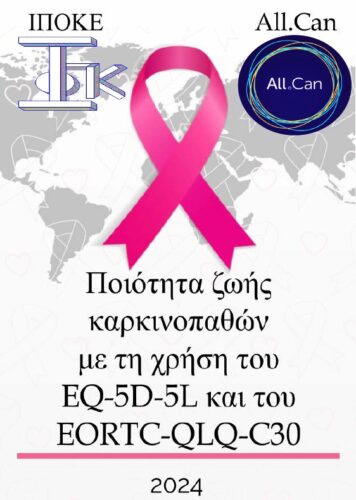
All.Can Greece publishes its research entitled “Quality of Life for Cancer Patients in Greece”.
The research aims at the investigation of quality of life and satisfaction of cancer patients and people with cancer treatment in Greece. The launching of the research and the analysis of the results were undertaken by John Yfantopoulos, Professor of Health Economics at the University of Athens and President of IPOKE in collaboration with the All.Can Greece steering committee.
Background
Cancer is one of the leading causes of death and a major threat of public health across the European Members States. In 2022 the incidence of Cancer (new cases) in the EU-27 was 2.78 million. This implies that five European Citizens are being diagnosed with cancer every minute. Greece is classified as a relatively low incidence country with estimated rates of 650 per 100.000 inhabitants for men and 436 for women. (The corresponding rates for the EU 27 average are 684 for men and 488 for women) The main factors contributing to cancer in Greece are smoking (25% in Greece versus 19% in EU-27) and limited physical exercise (80% in Greece versus 36% in EU-27). The economic cost of cancer as a share of Gross Domestic Product (GDP) varies between 1% to 1.5% of GDP.
The economic burden of cancer in Greece is unknown. Some estimates of the cost of cancer in selected European Countries reveal the wide variation reflecting differences in population size, the epidemiological profile as well as the organizational structure of delivering cancer treatments and services. The cancer cost in bil. Euros varies among the EU Countries i.e.: € 39.5 bil. in Germany, € 19.0 bil. in France, € 18.5 bil. in Italy, € 16.2 bil. in U.K., € 10.1 bil.in Spain, €7.1 bil in the Netherlands, and € 3.6 bil. in Belgium.
Aim
This research aims at the investigation of quality of life and satisfaction of cancer patients and people with cancer treatment in Greece. The launching of the research and the analysis of the results were undertaken by John Yfantopoulos Professor of Health Economics at the University of Athens and President of IPOKE in collaboration with All.Can Greece and the Hellenic Cancer Federation.
Objectives
The main purpose of this research is twofold:
First: to investigate the Health-Related Quality of Life (HRQoL) for cancer patients using a generic instrument based on the EuroQol methodology (EQ-5D-5L), and a disease specific instruments for cancer patients the EORTC-QLQ-C30. These tools would adequately highlight the epidemiological burden, and provide valuable information for a more effective, efficient, and socially equitable management of the disease.
Second: to assess patients’ satisfaction with i) their treatment, ii) access to oncology services, iii) overall lives in general, and iv) the impact of cancer therapy on their family, professional, sexual and social life,
Methodology
HRQoL is a comprehensive concept that encompasses various aspects of an individual’s well-being, including physical health, mental health, and social functioning, in the context of their health condition and healthcare experiences. Cancer and its treatments can significantly impact each of these dimensions, leading to a substantial reduction in HRQoL. Common physical symptoms in cancer patients, such as pain, fatigue, and limitations in daily activities, can be exacerbated by treatment-related side effects. The emotional toll of cancer, including anxiety, depression, and fear of the unknown, can contribute to a diminished sense of well-being. Additionally, the social aspect of HRQoL can be compromised due to changes in roles, relationships, and disruptions to daily life caused by the disease.
A multicenter, cross-sectional study was conducted among 374 cancer patients and people with cancer experience in Greece. Data were collected through face-to-face interviews utilizing the EQ-5D and EORTC QLQ-C30 instruments to evaluate HRQoL and to assess work productivity impairment due to health issues.
Descriptive statistics, frequency tables and correlations (Pearson’s r) were performed. In addition, normality testing was conducted. Cronbach’s alpha between the EQ-5D-5L dimensions and between the EORTC-QLQ-C30 dimensions for the dimensions of functioning and symptoms were analyzed. Multiple regression analyses were also investigated to identify independent factors associated with HRQoL and work productivity.
The analyses were performed using the SPSS program.
Results
Our findings revealed significant disparities in HRQoL, satisfaction and work productivity for cancer patients in Greece. Cronbach’s alpha results demonstrated strong internal reliability for both the EQ-5D-5L (0.808) and between questions of the EORTC-QLQ-C30. The most significant problems were experienced by patients in the dimensions of anxiety/depression (19.5%), pain/discomfort (8%) and finally during usual activities (7.5%) according to cancer patients’ responses to the EQ-5D-5L. All five EQ-5D-5Ldimensions are statistically significant and positively related to each other. The derived utilities have a mean value of EQ-5D-Index = 0.6754 and a standard deviation of +/- 0.25658. Around 50% of the sample has values greater than or equal to EQ-5D-Index =0.7360. Only 2% of the sample has values less than zero. Based on the EORTC QLQ-C30 questionnaire, it is observed that social (mean=56.8) and emotional functioning (mean=60) have the lowest satisfaction scores and thus have a more negative impact on the quality of life of cancer patients. Regarding the influence of symptoms on patients’ quality of life, the greatest problems are observed in feeling fatigue (mean=48.66), insomnia (mean=42.602) and loss of appetite (mean=42.602). Finally, patients are extremely satisfied with their treatment and their access to oncology services, while it was found that cancer has a very significant impact on the sexual and family life of patients.
Conclusions
Cancer significantly affects the HRQoL, daily activities, lifestyle, satisfaction and work productivity of cancer patients in Greece, emphasizing the need for tailored interventions addressing symptoms, psychological support, and strategies to improve daily functioning. Collaborative efforts involving healthcare providers, employers, and policymakers are essential to support cancer patients effectively.
You may read the report here (in Greek)
For more details, please contact
Prof. John Yfantopoulos
e-mail:yfantopoulos@gmail.com